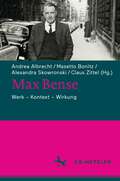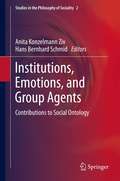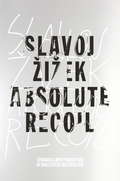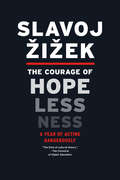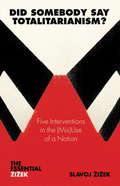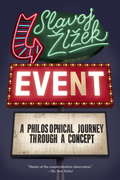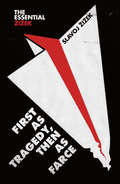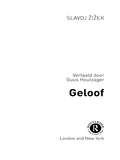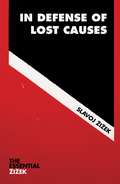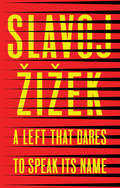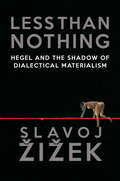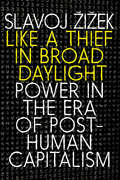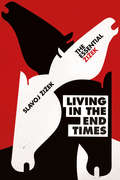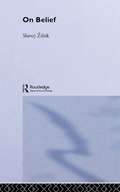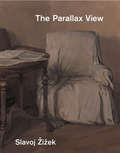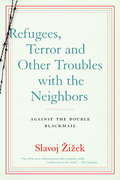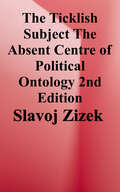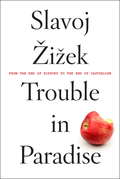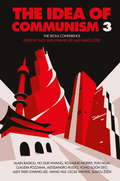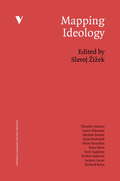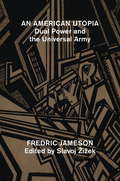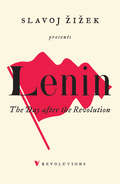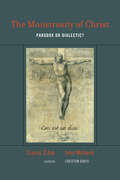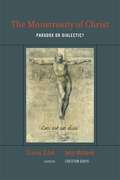- Table View
- List View
Max Bense: Werk - Kontext - Wirkung (Abhandlungen Zur Philosophie Ser.)
by Claus Zittel Andrea Albrecht Masetto Bonitz Alexandra SkowronskiMax Bense (1910–1990) gilt als Vorreiter der Computerkunst und der Technikphilosophie und war ein engagierter Förderer von Kunst und Literatur, Promotor interdisziplinären Denkens und politischer Provokateur. Häufig ist es bei der Auseinandersetzung mit Bense jedoch bei diesen Etikettierungen geblieben. Der Sammelband nimmt daher eine konzertierte Neuaufnahme der Diskussion von Max Benses Arbeiten aus literaturwissenschaftlicher, philosophie- und wissenschaftshistorischer sowie aus medien- und ästhetiktheoretischer Perspektive vor. Er versammelt Beiträge zu Themenkomplexen wie der Semiotik, Technikphilosophie, experimentellen Poesie und Ästhetiktheorie, zu Benses lokalen und internationalen Kontakten und Netzwerken sowie zu seinem publizistischen Verhalten im Nationalsozialismus und in der Nachkriegszeit.
Institutions, Emotions, and Group Agents
by Anita Konzelmann Ziv Hans Bernhard SchmidThe contributions gathered in this volume present the state of the art in key areas of current social ontology. They focus on the role of collective intentional states in creating social facts, and on the nature of intentional properties of groups that allow characterizing them as responsible agents, or perhaps even as persons. Many of the essays are inspired by contemporary action theory, emotion theory, and theories of collective intentionality. Another group of essays revisits early phenomenological approaches to social ontology and accounts of sociality that draw on the Hegelian idea of recognition. This volume is organized into three parts. First, the volume discusses themes highlighted in John Searle's work and addresses questions concerning the relation between intentions and the deontic powers of institutions, the role of disagreement, and the nature of collective intentionality. Next, the book focuses on joint and collective emotions and mutual recognition, and then goes on to explore the scope and limits of group agency, or group personhood, especially the capacity for responsible agency. The variety of philosophical traditions mirrored in this collection provides readers with a rich and multifaceted survey of present research in social ontology. It will help readers deepen their understanding of three interrelated and core topics in social ontology: the constitution and structure of institutions, the role of shared evaluative attitudes, and the nature and role of group agents.
The Marrano Specter: Derrida and Hispanism
by Erin Graff Zivin Peggy Kamuf Geoffrey Bennington Patrick Dove Jaime Hanneken David Kelman Brett Levinson Jacques Lezra Alberto Moreiras Gareth WilliamsThe Marrano Specter pursues the reciprocal influence between Jacques Derrida and Hispanism. On the one hand, Derrida’s work has engendered a robust conversation among philosophers and critics in Spain and Latin America, where his work circulates in excellent translation, and where many of the terms and problems he addresses take on a distinctive meaning: nationalism and cosmopolitanism; spectrality and hauntology; the relation of subjectivity and truth; the university; disciplinarity; institutionality.Perhaps more remarkably, the influence is in a profound sense reciprocal: across his writings, Derrida grapples with the theme of marranismo, the phenomenon of Sephardic crypto-Judaism. Derrida’s marranismo is a means of taking apart traditional accounts of identity; a way for Derrida to reflect on the status of the secret; a philosophical nexus where language, nationalism, and truth-telling meet and clash in productive ways; and a way of elaborating a critique of modern biopolitics. It is much more than a simple marker of his work’s Hispanic identity, but it is also, and irreducibly, that.The essays collected in The Marrano Specter cut across the grain of traditional Hispanism, but also of the humanistic disciplines broadly conceived. Their vantage point—the theoretical, philosophically inflected critique of disciplinary practices—poses uncomfortable, often unfamiliar questions for both hispanophone studies and the broader theoretical humanities.
Absolute Recoil
by Slavoj ZizekPhilosophical materialism in all its forms - from scientific naturalism to Deleuzian New Materialism - has failed to meet the key theoretical and political challenges of the modern world. This is the burden of philosopher Slavoj i ek's argument in this pathbreaking and eclectic new work. Recent history has seen developments such as quantum physics and Freudian psychoanalysis, not to speak of the failure of twentieth-century communism, shake our understanding of existence.In the process, the dominant tradition in Western philosophy lost its moorings. To bring materialism up to date, i ek - himself a committed materialist and communist - proposes a radical revision of our intellectual heritage. He argues that dialectical materialism is the only true philosophical inheritor of what Hegel designated the "speculative" approach in thought.Absolute Recoil is a startling reformulation of the basis and possibilities of contemporary philosophy. While focusing on how to overcome the transcendental approach without regressing to naïve, pre-Kantian realism, i ek offers a series of excursions into today's political, artistic, and ideological landscape, from Arnold Schoenberg's music to the films of Ernst Lubitsch.From the Hardcover edition.
The Courage of Hopelessness: Chronicles Of A Year Of Acting Dangerously
by Slavoj ZizekIn THE COURAGE OF HOPELESSNESS, maverick philosopher Slavoj Zizek returns to explore today's ideological, political and economic battles, and asks whether radical change is possible.In these troubled times, even the most pessimistic diagnosis of our future ends with an uplifting hint that things might not be as bad as all that, that there is light at the end of the tunnel. Yet, argues Slavoj Žižek, it is only when we have admitted to ourselves that our situation is completely hopeless - that the light at the end of the tunnel is in fact the headlight of a train - that fundamental change can be brought about.
Did Somebody Say Totalitarianism?
by Slavoj ZizekIn some circles, a nod towards totalitarianism is enough to dismiss any critique of the status quo. Such is the insidiousness of the neo-liberal ideology, argues Slavoj i ek. Did Somebody Say Totalitarianism? turns a specious rhetorical strategy on its head to identify a network of family resemblances between totalitarianism and modern liberal democracy. i ek argues that totalitarianism is invariably defined in terms of four things: the Holocaust as the ultimate, diabolical evil; the Stalinist gulag as the alleged truth of the socialist revolutionary project; ethnic and religious fundamentalisms, which are to be fought through multiculturalist tolerance; and the deconstructionist idea that the ultimate root of totalitarianism is the ontological closure of thought. i ek concludes that the devil lies not so much in the detail but in what enables the very designation totalitarian: the liberal-democratic consensus itself.From the Trade Paperback edition.
Event
by Slavoj ZizekProbably the most famous living philosopher, Slavoj i ek explores the meaning of events in this short and digestible book An event can be an occurrence that shatters ordinary life, a radical political rupture, a transformation of reality, a religious belief, the rise of a new art form, or an intense experience such as falling in love. Taking us on a trip that stops at different definitions of event, i ek addresses fundamental questions such as: are all things connected? How much are we agents of our own fates? Which conditions must be met for us to perceive something as really existing? In a world that's constantly changing, is anything new really happening? Drawing on references from Plato to arthouse cinema, the Big Bang to Buddhism, Event is a journey into philosophy at its most exciting and elementary.From the Trade Paperback edition.
First As Tragedy, Then As Farce
by Slavoj ZizekBillions of dollars have been hastily poured into the global banking system in a frantic attempt at financial stabilization. So why has it not been possible to bring the same forces to bear in addressing world poverty and environmental crisis?In this take-no-prisoners analysis, Slavoj i ek frames the moral failures of the modern world in terms of the epoch-making events of the first decade of this century. What he finds is the old one-two punch of history: the jab of tragedy, the right hook of farce. In the attacks of 9/11 and the global credit crunch, liberalism dies twice: as a political doctrine and as an economic theory.First as Tragedy, Then as Farce is a call for the Left to reinvent itself in the light of our desperate historical situation. The time for liberal, moralistic blackmail is over.
Geloof (Routledge filosofie)
by Slavoj ZizekHoe kunnen we nog geloven en regels hebben in dit postmoderne tijdperk waarin naar verluidt niets is om in te geloven en geen regels zijn. De beroemde filosoof en onstuitbaar cultuurcriticus Slavoj Zizek daagt iedereen uit in dit overtuigende en adembenemende nieuwe boek.In Geloof, dat van 'cyberspace-denken' tot de paradox van het 'westerse boeddhisme' gaat, legt Zizek de vooronderstellingen bloot achter de manier waarop we gewoonlijk over geloof denken, met name in judaïsme en christendom. Door de zogenaamde authenticiteit van het religieuze geloof tegen een kritisch licht te houden en te putten uit psychoanalyse, film en filosofie, laat hij op schokkende wijze zien dat de basis van onze fundamenteelste overtuigingen minder rotsvast is dan wij denken.
In Defense of Lost Causes
by Slavoj ZizekIn this combative major new work, philosophical sharpshooter Slavoj i ek looks for the kernel of truth in the totalitarian politics of the past.Examining Heidegger's seduction by fascism and Foucault's flirtation with the Iranian Revolution, he suggests that these were the 'right steps in the wrong direction.' On the revolutionary terror of Robespierre, Mao and the bolsheviks, i ek argues that while these struggles ended in historic failure and horror, there was a valuable core of idealism lost beneath the bloodshed.A redemptive vision has been obscured by the soft, decentralized politics of the liberal-democratic consensus. Faced with the coming ecological crisis, i ekk argues the case for revolutionary terror and the dictatorship of the proletariat. A return to past ideals is needed despite the risks. In the words of Samuel Beckett: 'Try again. Fail again. Fail better.'
A Left that Dares to Speak Its Name: 34 Untimely Interventions
by Slavoj ZizekWith irrepressible humor, Slavoj i ek dissects our current political and social climate, discussing everything from Jordan Peterson and sex “unicorns” to Greta Thunberg and Chairman Mao. Taking aim at his enemies on the Left, Right, and Center, he argues that contemporary society can only be properly understood from a communist standpoint. Why communism? The greater the triumph of global capitalism, the more its dangerous antagonisms multiply: climate collapse, the digital manipulation of our lives, the explosion in refugee numbers – all need a radical solution. That solution is a Left that dares to speak its name, to get its hands dirty in the real world of contemporary politics, not to sling its insults from the sidelines or to fight a culture war that is merely a fig leaf covering its political and economic failures. As the crises caused by contemporary capitalism accumulate at an alarming rate, the Left finds itself in crisis too, beset with competing ideologies and prone to populism, racism, and conspiracy theories. A Left that Dares to Speak Its Name is i ek’s attempt to elucidate the major political issues of the day from a truly radical Leftist position. The first three parts explore the global political situation and the final part focuses on contemporary Western culture, as i ek directs his polemic to topics such as wellness, Wikileaks, and the rights of sexbots. This wide-ranging collection of essays provides the perfect insight into the ideas of one of the most influential radical thinkers of our time.
Less Than Nothing
by Slavoj ZizekFor the last two centuries, Western philosophy has developed in the shadow of Hegel, an influence each new thinker struggles to escape. As a consequence, Hegel's absolute idealism has become the bogeyman of philosophy, obscuring the fact that he is the defining philosopher of the historical transition to modernity, a period with which our own times share startling similarities. Today, as global capitalism comes apart at the seams, we are entering a new period of transition. In Less Than Nothing, the product of a career-long focus on the part of its author, Slavoj i ek argues it is imperative we not simply return to Hegel but that we repeat and exceed his triumphs, overcoming his limitations by being even more Hegelian than the master himself. Such an approach not only enables i ek to diagnose our present condition, but also to engage in a critical dialogue with key strands of contemporary thought--Heidegger, Badiou, speculative realism, quantum physics, and cognitive sciences. Modernity will begin and end with Hegel.From the Trade Paperback edition.
Like a Thief in Broad Daylight: Power in the Era of Post-Human Capitalism
by Slavoj ZizekThe latest book from "the most despicable philosopher in the West" (New Republic) considers the new dangers and radical possibilities set in motion by advances in Big Tech.In recent years, techno-scientific progress has started to utterly transform our world--changing it almost beyond recognition. In this extraordinary new book, renowned philosopher Slavoj Žižek turns to look at the brave new world of Big Tech, revealing how, with each new wave of innovation, we find ourselves moving closer and closer to a bizarrely literal realization of Marx's prediction that "all that is solid melts into air." With the automation of work, the virtualization of money, the dissipation of class communities, and the rise of immaterial, intellectual labor, the global capitalist edifice is beginning to crumble, more quickly than ever before--and it is now on the verge of vanishing entirely.But what will come next? Against a backdrop of constant socio-technological upheaval, how could any kind of authentic change take place? In such a context, Žižek argues, there can be no great social triumph--because lasting revolution has already come into the scene, like a thief in broad daylight, stealing into sight right before our very eyes. What we must do now is wake up and see it. Urgent as ever, Like a Thief in Broad Daylight illuminates the new dangers as well as the radical possibilities thrown up by today's technological and scientific advances, and their electrifying implications for us all.
Living in the End Times
by Slavoj ZizekThe underlying premise of the book is a simple one: the global capitalist system is approaching an apocalyptic zero-point. Its four riders of the apocalypse are the ecological crisis, the consequences of the biogenetic revolution, the imbalances within the system itself (problems with intellectual property, the forthcoming struggle for raw materials, food and water), and the explosions of social divisions and exclusions. Society's first reaction is ideological denial, then explosions of anger at the injustices of the new world order, attempts at bargaining, and when this fails, depression and withdrawal set in. Finally, after passing through this zero-point we no longer perceive it as a threat, but as the chance for a new beginning. or, as Mao Zedong might have put it, "There is great disorder under heaven, the situation is excellent." i ek traces out in detail these five stances, makes a plea for a return to the Marxian critique of political economy, and sniffs out the first signs of a budding communist culture in all its diverse forms--in utopias that range from Kafka's community of mice to the collective of freak outcasts in the TV series Heroes.
On Belief (Thinking in Action)
by Slavoj ZizekWhat is the basis of belief in an era when globalization, multiculturalism and big business are the new religion? Slavoj Zizek, renowned philosopher and irrepressible cultural critic takes on all comers in this compelling and breathless new book.From 'cyberspace reason' to the paradox that is 'Western Buddhism', On Belief gets behind the contours of the way we normally think about belief, in particular Judaism and Christianity. Holding up the so-called authenticity of religious belief to critical light, Zizek draws on psychoanalysis, film and philosophy to reveal in startling fashion that nothing could be worse for believers than their beliefs turning out to be true.
The Parallax View (Short Circuits)
by Slavoj ZizekIn Žižek's long-awaited magnum opus, he theorizes the "parallax gap" in the ontological, the scientific, and the political—and rehabilitates dialectical materialism. The Parallax View is Slavoj Žižek's most substantial theoretical work to appear in many years; Žižek himself describes it as his magnum opus. Parallax can be defined as the apparent displacement of an object, caused by a change in observational position. Žižek is interested in the "parallax gap" separating two points between which no synthesis or mediation is possible, linked by an "impossible short circuit" of levels that can never meet. From this consideration of parallax, Žižek begins a rehabilitation of dialectical materialism. Modes of parallax can be seen in different domains of today's theory, from the wave-particle duality in quantum physics to the parallax of the unconscious in Freudian psychoanalysis between interpretations of the formation of the unconscious and theories of drives. In The Parallax View, Žižek, with his usual astonishing erudition, focuses on three main modes of parallax: the ontological difference, the ultimate parallax that conditions our very access to reality; the scientific parallax, the irreducible gap between the phenomenal experience of reality and its scientific explanation, which reaches its apogee in today's brain sciences (according to which "nobody is home" in the skull, just stacks of brain meat—a condition Žižek calls "the unbearable lightness of being no one"); and the political parallax, the social antagonism that allows for no common ground. Between his discussions of these three modes, Žižek offers interludes that deal with more specific topics—including an ethical act in a novel by Henry James and anti-anti-Semitism. The Parallax View not only expands Žižek's Lacanian-Hegelian approach to new domains (notably cognitive brain sciences) but also provides the systematic exposition of the conceptual framework that underlies his entire work. Philosophical and theological analysis, detailed readings of literature, cinema, and music coexist with lively anecdotes and obscene jokes.
Refugees, Terror and Other Troubles with the Neighbors: Against the Double Blackmail
by Slavoj ZizekCalled "the Elvis of cultural theory" by The New York Times, popular philosopher and leftist rabble-rouser Slavoj Zizek, looks at one of the most desperate situations of our time: the current refugee crisis overwhelming Europe. In this short yet stirring book, Zizek argues that accepting all comers or blocking all entry are both untenable solutions... but there is a third option.Today, hundreds of thousands of people, desperate to escape war, violence and poverty, are crossing the Mediterranean to seek refuge in Europe. Our response, from our protected Western European standpoint, argues Slavoj Zizek, offers two versions of ideological blackmail: either we open our doors as widely as possible; or we try to pull up the drawbridge. Both solutions are bad, states Zizek. They merely prolong the problem, rather than tackling it.The refugee crisis also presents an opportunity, a unique chance for Europe to redefine itself: but, if we are to do so, we have to start raising unpleasant and difficult questions. We must also acknowledge that large migrations are our future: only then can we commit to a carefully prepared process of change, one founded not on a community that see the excluded as a threat, but one that takes as its basis the shared substance of our social being.The only way, in other words, to get to the heart of one of the greatest issues confronting Europe today is to insist on the global solidarity of the exploited and oppressed. Maybe such solidarity is a utopia. But, warns Zizek, if we don't engage in it, then we are really lost. And we will deserve to be lost.
The Ticklish Subject: The Absent Centre of Political Ontology (The Essential Zizek Series)
by Slavoj ZizekSlavoj Zizek, the maverick philosopher, author of over 30 books, acclaimed as the "Elvis of cultural theory", and today's most controversial public intellectual. His work traverses the fields of philosophy, psychoanalysis, theology, history and political theory, taking in film, popular culture, literature and jokes--all to provide acute analyses of the complexities of contemporary ideology as well as a serious and sophisticated philosophy. His recent films The Pervert's Guide to the Cinema and Zizek! reveal a theorist at the peak of his powers and a skilled communicator. <p><p>Now Verso is making his classic titles, each of which stand as a core of his ever-expanding life's work, available as new editions. Each is beautifully re-packaged, including new introductions from Zizek himself. Simply put, they are the essential texts for understanding Zizek's thought and thus cornerstones of contemporary philosophy. <p><p>The Ticklish Subject: The Absent Centre of Political Ontology: A specter is haunting Western thought, the specter of the Cartesian subject. In this book Slavoj Zizek unearths a subversive core to this elusive specter, and finds within it the indispensable philosophical point of reference for any genuinely emancipatory project.
Trouble in Paradise
by Slavoj ZizekIn Trouble in Paradise, Slavoj i ek, one of our most famous, most combative philosophers, explains how we can find a way out of the crisis of capitalism. There is obviously trouble in the global capitalist paradise. But why do we find it so difficult to imagine a way out of the crisis we're in? It is as if the trouble feeds on itself: the march of capitalism has become inexorable, the only game in town. Setting out to diagnose the condition of global capitalism, the ideological constraints we are faced with in our daily lives, and the bleak future promised by this system, Slavoj i ek explores the possibilities--and the traps--of new emancipatory struggles. Drawing insights from phenomena as diverse as "Gangnam Style" to Marx, The Dark Knight to Thatcher, Trouble in Paradise is an incisive dissection of the world we inhabit, and the new order to come.From the Hardcover edition.
The Idea of Communism 3: The Seoul Conference
by Slavoj Zizek Alex Taek-Gwang LeeAn all-star cast of radical intellectuals discuss the continued importance of communist principlesIn 2009 Slavoj i ek brought together an acclaimed group of intellectuals to discuss the continued relevance of communism. Unexpectedly the conference attracted an audience of over 1,000 people. The discussion has continued across the world and this book gathers responses from the conference in Seoul. It includes the interventions of regular contributors Alain Badiou and Slavoj i ek, as well as work from across Asia, notably from Chinese scholar Wang Hui, offering regional perspectives on communism in an era of global economic crisis and political upheaval.From the Trade Paperback edition.
Mapping Ideology
by Slavoj Zizek Michele Barrett Theodor Adorno Louis Althusser Nicholas AbercrombieFor a long time, the term "ideology" was in disrepute, having become associated with such unfashionable notions as fundamental truth and the eternal verities. The tide has turned, and recent years have seen a revival of interest in the questions that ideology poses to social and cultural theory and to political practice.Including Slavoj i ek's study of the development of the concept from Marx to the present, assessments of the contributions of Lukács and the Frankfurt School by Terry Eagleton, Peter Dews and Seyla Benhabib, and essays by Adorno, Lacan and Althusser, Mapping Ideology is an invaluable guide to the most dynamic field in cultural theory.
An American Utopia: Dual Power and the Universal Army
by Slavoj Zizek Fredric JamesonControversial manifesto by acclaimed cultural theorist debated by leading writers Fredric Jameson's pathbreaking essay "An American Utopia" radically questions standard leftist notions of what constitutes an emancipated society. Advocated here are--among other things--universal conscription, the full acknowledgment of envy and resentment as a fundamental challenge to any communist society, and the acceptance that the division between work and leisure cannot be overcome. To create a new world, we must first change the way we envision the world. Jameson's text is ideally placed to trigger a debate on the alternatives to global capitalism. In addition to Jameson's essay, the volume includes responses from philosophers and political and cultural analysts, as well as an epilogue from Jameson himself. Many will be appalled at what they will encounter in these pages--there will be blood! But perhaps one has to spill such (ideological) blood to give the Left a chance. Contributing are Kim Stanley Robinson, Jodi Dean, Saroj Giri, Agon Hamza, Kojin Karatani, Frank Ruda, Alberto Toscano, Kathi Weeks, and Slavoj i ek.From the Trade Paperback edition.
Lenin 2017: Remembering, Repeating, and Working Through
by Slavoj Zizek V. I. LeninOne hundred years after the Russian Revolution, i ek shows why Lenin’s thought is still important todayLenin’s originality and importance as a revolutionary leader is most often associated with the seizure of power in 1917. But, i ek argues in this new study and collection of original texts, Lenin’s true greatness can be better grasped in the very last couple of years of his political life. Russia had survived foreign invasion, embargo and a terrifying civil war, as well as internal revolts such as at Kronstadt in 1921. But the new state was exhausted, isolated and disorientated in the face of the world revolution that seemed to be receding. New paths had to be sought, almost from scratch, for the Soviet state to survive and imagine some alternative route to the future. With his characteristic brio and provocative insight, i ek suggests that Lenin’s courage as a thinker can be found in his willingness to face this reality of retreat lucidly and frontally.From the Hardcover edition.
The Monstrosity of Christ: Paradox or Dialectic? (Short Circuits)
by Slavoj Zizek John MilbankA militant Marxist atheist and a “Radical Orthodox” Christian theologian square off on everything from the meaning of theology and Christ to the war machine of corporate mafia. In this corner, philosopher Slavoj Žižek, a militant atheist who represents the critical-materialist stance against religion's illusions; in the other corner, “Radical Orthodox” theologian John Milbank, an influential and provocative thinker who argues that theology is the only foundation upon which knowledge, politics, and ethics can stand. In The Monstrosity of Christ, Žižek and Milbank go head to head for three rounds, employing an impressive arsenal of moves to advance their positions and press their respective advantages. By the closing bell, they have not only proven themselves worthy adversaries, they have shown that faith and reason are not simply and intractably opposed. Žižek has long been interested in the emancipatory potential offered by Christian theology. And Milbank, seeing global capitalism as the new century's greatest ethical challenge, has pushed his own ontology in more political and materialist directions. Their debate in The Monstrosity of Christ concerns the future of religion, secularity, and political hope in light of a monsterful event—God becoming human. For the first time since Žižek's turn toward theology, we have a true debate between an atheist and a theologian about the very meaning of theology, Christ, the Church, the Holy Ghost, Universality, and the foundations of logic. The result goes far beyond the popularized atheist/theist point/counterpoint of recent books by Christopher Hitchens, Richard Dawkins, and others. Žižek begins, and Milbank answers, countering dialectics with “paradox.” The debate centers on the nature of and relation between paradox and parallax, between analogy and dialectics, between transcendent glory and liberation. Slavoj Žižek is a philosopher and cultural critic. He has published over thirty books, including Looking Awry, The Puppet and the Dwarf, and The Parallax View (these three published by the MIT Press). John Milbank is an influential Christian theologian and the author of Theology and Social Theory: Beyond Secular Reason and other books. Creston Davis, who conceived of this encounter, studied under both Žižek and Milbank.
The Monstrosity of Christ: Paradox or Dialectic?
by Slavoj Zizek John Milbank Creston DavisIf the theological was marginalized in the age of Western secular modernity, it has now returned with a vengeance. Theology is reconfiguring the very makeup of the humanities in general, with disciplines like philosophy, political science, literature, history, psychoanalysis, and critical theory, in particular, feeling the impact of this return.
